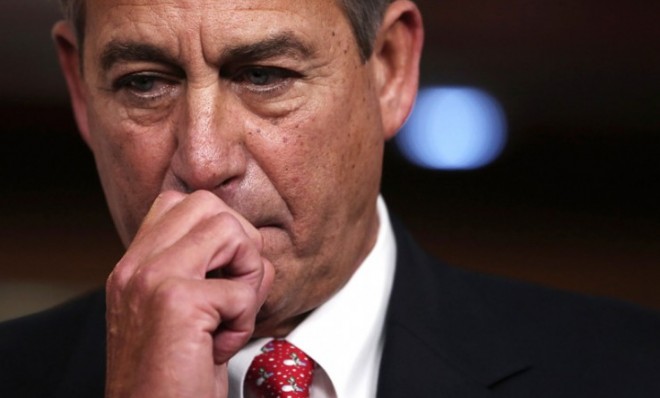Fiscal cliff fail: Should Congress reject its pay raise?
Obama is lifting a freeze on federal employees, meaning the disgraceful Congress that can't even fix its own self-imposed fiscal wreck will get a pay bump


A free daily email with the biggest news stories of the day – and the best features from TheWeek.com
You are now subscribed
Your newsletter sign-up was successful
Despite more than a year of warning, weeks of negotiations, and a flurry of last-minute brinksmanship, "the fiscal cliff commeth," say Chris Cillizza and Aaron Blake at The Washington Post. Vice President Joe Biden, brought in Sunday evening to jump-start stalled talks, apparently made what Politico calls some "major progress" overnight on a deal with House Minority Leader Mitch McConnell (R-Ky.). But even if a last-minute stop-gap measure is approved before the tax increases and spending cuts kick in at midnight, "one lesson is already crystal clear: Congress has failed." That's probably not news to most Americans: Gallup found that Congress had raised its approval rating to a still-dismal 18 percent in December, largely on the assumption that lawmakers would reach a deal, but noted that "Congress' job approval could fall significantly if the 'cliff' is not avoided by the deadline."
Given the public disdain for Congress, it's not surprising that people across the political spectrum are unimpressed that their representatives in Washington are scheduled to get a raise next year, even a modest 0.5 percent bump. Here's what happened: On Dec. 27, President Obama extended a freeze on federal salaries he ordered in 2010, but only until March 27, 2013. After that, he expects an end to the three-year freeze, with federal employees — including all members of Congress and Vice President Joe Biden — getting a raise of about half of 1 percent. That means rank-and-file senators and House members will get a $900 annual raise, to $174,900; House Speaker John Boehner (R-Ohio) will see a $1,100 increase, to $224,600; McConnell and Senate Majority Leader Harry Reid (D-Nev.) will each get $1,000 more, at $194,400; and Biden will earn $231,900, or roughly $5,000 a year more.
"Some have questioned," deadpans FoxNews.com, "why the president would give Congress a pat on the back at a time when neither Republicans nor Democrats have been able to come to a compromise on how to head off $600 billion in automatic tax hikes and spending cuts that will kick in Jan. 1." Yes, let's look at what Congress did to deserve the $500 million collective raise we're giving it in 2013, says Kelly Phillips Erb at Forbes. When lawmakers weren't occupied not solving the fiscal cliff they themselves created, "Congress has been vacationing and recessing pretty hard," taking seven weeks off for the election and five weeks off in the summer — at a cost of $3,480 a week.
The Week
Escape your echo chamber. Get the facts behind the news, plus analysis from multiple perspectives.

Sign up for The Week's Free Newsletters
From our morning news briefing to a weekly Good News Newsletter, get the best of The Week delivered directly to your inbox.
From our morning news briefing to a weekly Good News Newsletter, get the best of The Week delivered directly to your inbox.
We paid more than $20,000,000 for Congress not to work for most of the summer and fall, not including federal holidays and the like... Cause that’s the way it works at your place of employment, right? You get nothing done, take lots of vacation, leave work early, and you get a raise?
Ugh. Congress must be the only job "where being unproductive and ineffective won't hurt your chances of getting a raise," says Tracy Bloom at TruthDig. I mean, not only did lawmakers get "less done than any previous Congress since the 1940s," but their bungling will cost the rest of us. Seriously, "as they say in the business, this one has 'bad optics'," says Rick Moran at the American Thinker. America is still digging its way out of an unemployment crisis, and "it seems ridiculous that the architects of our problems are rewarded with pay raises — small though they may be."
But just because Obama offered them an extra grand a year each doesn't mean they have to take it. Congress controls the purse strings of government, after all. Or, Congress could just take some advice from billionaire Warren Buffet, who laid out this plan for fixing the deficit in a 2011 interview with CNBC:
I could end the deficit in five minutes. You just pass a law that says that any time there's a deficit of more than three percent of GDP, all sitting members of Congress are ineligible for re-election. Yeah, yeah, now you've got the incentives in the right place, right? (Laughs) So, it's capable of being done. And they're trying to use the incentive now that we're going to blow your brains out, America, in terms of your debt-worthiness over time. And that's being used as a threat. A more effective threat would be just to say, "If you guys can't get it done, we'll get some other guys to get it done."
A free daily email with the biggest news stories of the day – and the best features from TheWeek.com
Peter has worked as a news and culture writer and editor at The Week since the site's launch in 2008. He covers politics, world affairs, religion and cultural currents. His journalism career began as a copy editor at a financial newswire and has included editorial positions at The New York Times Magazine, Facts on File, and Oregon State University.
